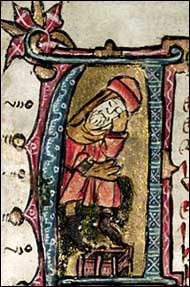
Detail from Corpus Christi MS 201 f.1r.

WILLIAM LANGLAND, the generally accepted author of the Medieval allegorical poem Piers Plowman, is a figure of whom there is no mention
in contemporary records. Everything written about his life is educated conjecture based on Langland's texts and later allusions.
Langland was born sometime around 1330. In the B-Text of Piers Plowman, composed around 1377, Imagination says he has followed him "this five
and forty winters." In the Dublin manuscript (D.4.1), a note in a fifteenth-century hand claims that Langland's father was one "Stacy de Rokayle."
In mid-sixteenth century, Bale in his Illustris Majoris Britanniae wrote that Langland was from "Mortymers Clibury" (now
Cleobury Mortimer) in Shropshire near the Malvern Hills where Piers Plowman opens. There was a hamlet named "Langley" nearby, which may explain his last name.1
The poet was educated, inferred both from his own testimony and the quality of his writing, but it is not known where. He seems to have taken so-called 'minor orders' in the church, but, perhaps because he had married, had never taken the 'greater orders'. In Piers Plowman, he mentions "Kytte (Kitty, endearment for Katherine) my Wyf and Kalotte (endearment for Nicolette?) my daughter." At some point, Langland moved to London, where he made a starving wage as a "singer" of masses and as a clerk copying legal documents. He had the reputation of a man who did not bow to his superiors, a man "loathe to reverence lords or ladies, or any soul else."
Langland wrote and rewrote the Vision of Piers Plowman from around 1362 to the time of his death, in at least three different versions or editions, now classified into the A-Text, B-Text, and C-text. Over 50 versions are known to exist in manuscript form, some of them fragmentary. The first edition (A-Text) contains twelve passus or cantos, the second (B-Text) twenty, the third (C-Text) twenty-three. The first group contains no allusions beyond 1362, the second group is thought to have been composed around 1377, and the third group in the 1380s. There is also a "Z-Text", which has been claimed to be a draft even earlier than the A-Text, but acceptance of its authenticity is not unanimous.2 The B-Text is the most complete and strongest poetically, and the one usually studied by college students.
John But, writing in 1387, described Langland as dead, so he can be thought to have died in 1386-7. Others, however, think it is possible that Langland was the author of a poem about the misgovernment of King Richard II, called "Richard the Redeless" (1399). If Langland was the poem's author, who was living in Bristol at the time, it would mean he returned to the west before his death, sometime around the year 1400.
"He was not only a keen observer and thinker, but also an effective writer. His intense feeling for his fellow-men, his profound pity for their sad plight, unshepherded and guideless as he beheld them, were made effective by his imaginative power and his masterly gift of language and expression. He sees vividly the objects and the sights he describes, and makes his readers see them vividly. He is as exact and realistic as Dante, however inferior in the greatness of his conceptions or in nobleness of poetic form."
— J.W. Hales. |
|